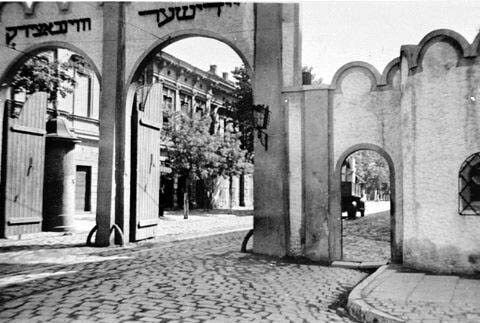Podgorze Gate to the Jewish Ghetto, historical photograph
Until this morning, what I still had was confidence in the Poles; now I don’t even have that. I have been to Krzemionki today, where I was passing by bricklayers, and they took some lime and sprayed me with it [...]. I had plenty of lime in my hair, on my dress, all over my head, arms and legs, and that lime burnt my skin. And those bricklayers laughed. It’s really bad to be a Jew.
Renia Knoll, aged 14
The ghetto has four huge gates. And through these gates we are not allowed. It is strictly prohibited. The no. 3 tram passes up and down the main street. We are not allowed on the tram. It is strictly prohibited. That is why the tram never stops in the ghetto [...]. Once a boy tossed a few loaves of bread through a tram window to our feet.
Roma Liebling (Ligocka)
[...] right across the wall, across the gate, it is a different world. That world is also tormented by war, yet in a way it is also free. Out there children go to school, and adults work, stroll along the lighted streets or the Planty, visit exhibitions, listen to the bugle call sounded from the tower of St. Mary’s Church.
Halina Nelken, aged 17
Ania occasionally managed to get hold of some milk, cheese, eggs--the products we were slowly beginning to forget [...]. Ania would not say how she made it through to the other side of the ghetto, past the armed German posts and the Jewish and Polish policemen. We knew what awaited those caught escaping or smuggling. Yet how can one raise children, Ania would ask, without a single glass of milk?
Maniusia Weinfeld


